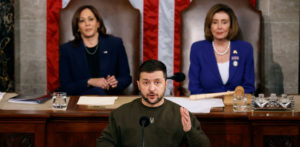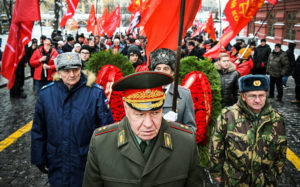A year ago, as Vladimir Putin launched his so-called “special military operation” to seize the Ukrainian capital, kill Volodymyr Zelenskyy and wipe much of the latter’s country from the map of Europe, who’d have imagined that the third week of February 2023 would begin with Joe Biden strolling around the streets of Kyiv in sunglasses? For that matter, who would have predicted that Mr Zelenskyy, only recently returned from his own trip to London, would be at his side — still the president of a free country, and still very much alive?
Sometimes it’s nice to be wrong. Like many, probably most Western observers, I held out little hope for Ukraine once the drums of war began to beat in earnest. A couple of days after Mr Putin’s brutal invasion began, I wrote a bullish essay looking back at Ukraine’s history of suffering and resilience. But even as I was agonising over my prose, the bleak news continued to pour in. “Now, while I have been writing, Russian tanks are rolling into the suburbs,” I wrote at one stage. Did I think they would be driven back? I didn’t. “Kyiv will rise again,” I wrote at the end. Stirring words, or so I hoped. But the person I was really trying to persuade was myself, and I didn’t succeed.
In truth, I underestimated the Ukrainian people’s resilience, their courage, their love of country. And I was wrong, too, about the Western alliance. After more than a decade of drift and inaction, from the shameful failure to respond to the seizure of Crimea to the near-criminal indifference to the suffering in Syria, I doubted whether any major Western leader would make more than a token protest about the first full-scale European invasion since the Forties. I never expected to see Finland and Sweden jump off the fence and apply for Nato membership. Nor did I imagine that Joe Biden would be so unswerving in his commitment, or so generous with US military aid. Above all, I never anticipated that Kyiv would hold out, that Kharkiv would stand or that Kherson would be retaken. As I say, it’s nice to be wrong.
It’s often said that the war in Ukraine feels like a throwback, returning us to an age when nationalistic strongmen nursed atavistic dreams of conquest, sending thousands of men to die so that they might scratch new frontiers into the soil of Europe. For all the drones and social media gimmicks, the fighting certainly feels old-fashioned: reading David Patrikarakos’s harrowing dispatch from the front line in Bakhmut, it’s impossible not to think of Passchendaele or Verdun. But for a child of the Seventies, perhaps the most old-fashioned thing of all is the spectacle of a genuinely clear-cut conflict, an unambiguous clash of right and wrong, that feels closer in spirit to the struggle against Hitler’s Germany than to most of the wars in my lifetime.
After all, just go through the list. Vietnam? A confused, dirty, morally squalid mess, a conflict defined in the public mind by My Lai, Agent Orange and that infamous picture of a little Vietnamese girl running naked in the road after a napalm attack. Yugoslavia? A horrendous internecine bloodbath, in which neighbour turned on neighbour while the Western powers stood by and wrung their hands. Iraq? A war based, at best, on a colossal exaggeration, in which an incontestably brutal dictator was toppled with little serious thought about what was to follow, unleashing a firestorm of chaos across the Middle East.
From the start, however, Ukraine has felt different — and some of that, at least, is down to Zelenskyy himself. He set the tone even before the first shots were fired, delivering an astonishing televised appeal in his own native tongue — not Ukrainian, but Russian — to the Russian people, imploring them to stand up against the invasion. Ever since, his defiant social media videos have been as cleverly judged as any Churchillian set-piece oration. More cynical readers might point out that he’s a practised performer with a clever scriptwriter, and of course they’d be right. But that’s true of any politician. And he didn’t have to choose that particular role. He could have run, and played the part of the president-in-exile, as so many leaders did in the Second World War. But he chose to stay, and history will reward him for it.
We should always be careful, of course, about reducing complicated international conflicts to simple morality tales. It’s undoubtedly true that the roots of the war lie in Russia’s sense of victimhood and resentment at the end of the Cold War. But that’s an explanation, not an excuse. Other European powers have lost colonial empires and tumbled down the diplomatic power rankings, from Britain to Belgium; would they all have been justified in lashing out?
Similarly, it’s clear Vladimir Putin feels genuinely aggrieved that so many Eastern European countries elected to join Nato in the Nineties and 2000s, contravening the verbal assurances that Western leaders gave to Mikhail Gorbachev. But nobody forced them; they made their own choices; and if he wants to know why, he could try looking in the mirror. Put it this way: if you were running a country in Eastern Europe, and had seen the way the Russians behaved in Chechnya and Georgia, wouldn’t you have wanted to join Nato, too? Would you rather be in Estonia’s shoes today? Or Ukraine’s?
As for Ukraine itself — yes, it’s complicated. History always is. It’s true that ever since independence, the country’s politics have been horrendously corrupt, as evidenced by Zelenskyy’s recent crackdown on venal ministers and officials. It’s also true, by the way, that its politics have long had an unpleasantly nationalistic, indeed openly neo-Nazi fringe. But I don’t think this is the devastating trump card that professional contrarians and Putin apologists think it is. If we were to withdraw our sympathy from every European country with unpleasant far-Right political elements, then we wouldn’t have any friends left. On that basis, would we still have supported Poland in 1939? Would we intervene to help Italy today, or France, or even the United States? Presumably not.
The really striking thing about the war in Ukraine, it seems to me, is that at a fundamental level it actually isn’t complicated. And for all the cheap and tawdry attractions of contrarianism, the right conclusion is the obvious conclusion. Ukraine didn’t attack Russia; Russia attacked Ukraine. Zelenskyy isn’t perfect and Putin isn’t Hitler; but one really is on the side of the angels, and the other will surely rank alongside the villains of history. One appeals to European solidarity and common humanity; the other to xenophobia and national chauvinism. One defends his own territory; the other seeks to seize somebody else’s. One is right, the other is wrong.
How, then, does it end? If you agree with, say, the late Jeremy Corbyn, then the answer is obvious. Peace is better than war, so all that matters is to make it stop. Go cap in hand to Moscow, and keep offering them territory until Vladimir Putin raises a hand and says: “Enough!” If you want to feel good about yourself, you can dress it up as offering the Russian president an “off-ramp”. Or, if you’d prefer to be honest, you can just call it appeasement.
The alternative is at once emotionally unsatisfying and boringly straightforward. And sadly it involves lots of people dying, because that’s the nature of war. It is simply to keep giving the Ukrainians the aid, weapons and emotional and political support they need, until they have driven every last occupier from their land — or until they’ve had enough and are prepared to cut a deal. But that should be their decision, not ours. After 12 months of war and more than 100,000 casualties, they’ve earned the right to make it. After all, we would want the same, if we were in their shoes. And like them, we’d want our friends to do the right thing.
Good versus evil; right versus wrong. In a complicated world, sometimes it really is that simple.
Disclaimer
Some of the posts we share are controversial and we do not necessarily agree with them in the whole extend. Sometimes we agree with the content or part of it but we do not agree with the narration or language. Nevertheless we find them somehow interesting, valuable and/or informative or we share them, because we strongly believe in freedom of speech, free press and journalism. We strongly encourage you to have a critical approach to all the content, do your own research and analysis to build your own opinion.
We would be glad to have your feedback.
Source: UnHerd Read the original article here: https://unherd.com/




